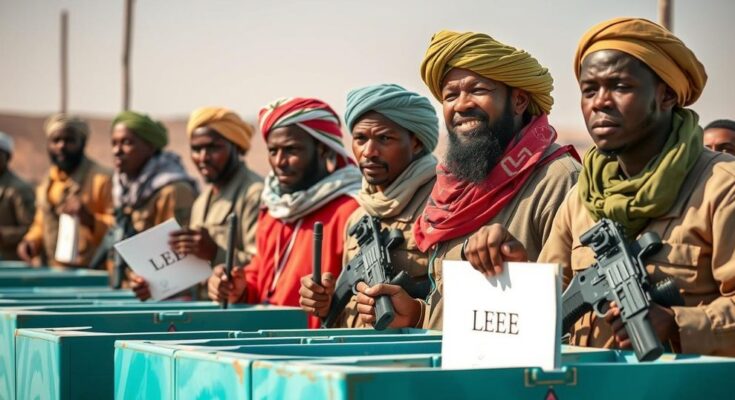Chad’s military and nomads began voting in general elections viewed as key to democratization, despite opposition boycotts labeling them sham. Approximately 45 percent participation was reported among military and nomadic tribes by midday Saturday, as discussions on improving living conditions amid climate challenges surfaced. The elections are set against a backdrop of security issues and a troubled political landscape under President Mahamat Deby.
Chad’s military personnel and nomadic tribes initiated their voting process on Saturday for general elections deemed by President Mahamat Idriss Deby Itno as a crucial step towards democratization. Opposition factions, however, have boycotted the elections, claiming they are merely a facade. The broader electorate is scheduled to cast their votes on Sunday, with polling from 6:00 am to 5:00 pm. At midday, preliminary reports indicated approximately 45 percent turnout among the military and nomads. Senior election official Ousmane Houzibe confirmed that the voting process was proceeding without incident, while representatives from nomadic communities expressed their desire for improvements to be made in their living conditions, which have been adversely affected by climate change. The election context is complicated by ongoing security threats from Boko Haram, the cessation of a military agreement with France, and the government’s alleged interference in Sudanese affairs. President Deby ascended to power in 2021 following his father’s lengthy dictatorship, with the last legislative elections having occurred in 2011, subsequent votes having been delayed due to various crises.
Chad, situated in the Sahel region of Africa, has a complex political landscape characterized by military rule and ongoing challenges to governance. The country has experienced significant instability following the death of long-time ruler Idriss Deby in 2021, which led to his son, Mahamat Idriss Deby Itno, assuming control. The military has been perceived as consolidating power, with the opposition denouncing attempts at elections as superficial attempts at democratic transition. The backdrop of violence from extremist groups and environmental challenges further complicates the socio-political context in Chad, heightening the urgency for genuine governance reforms.
In summary, the ongoing elections in Chad signify a pivotal moment amidst claims of systemic electoral fraud and a military government’s aspirations for democratic reforms. While the participation of military and nomadic voters on Saturday may reflect a portion of civic engagement, the overall legitimacy of the electoral process remains under scrutiny due to widespread opposition boycotts and pressing socio-economic challenges. The developments in Chad will require careful observation to assess the potential for substantive political change.
Original Source: www.barrons.com




